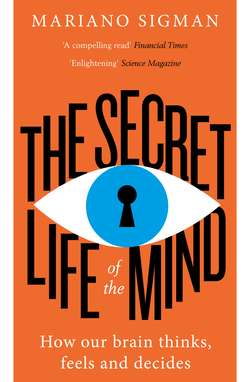Читать книгу The Secret Life of the Mind: How Our Brain Thinks, Feels and Decides - Mariano Sigman - Страница 34
Sniffing out love
ОглавлениеPerhaps the most important and complex decisions that we make are social and emotional. It may seem strange, almost absurd, to decide whom to fall in love with in a deliberate way, by some arithmetic evaluation of arguments for and against that person we feel so drawn to. That’s just not how it works. We fall in love for reasons that are generally mysterious and can only be determined sketchily after some time has passed.
At pheromone parties, each participant sniffs the clothing that’s been worn for a few days by other guests. Based on the odour print that attracts them, they decide whom to approach at the party. Choosing this way seems natural because we associate our sense of smell with intuition, like when we say that ‘something smells fishy.’ And because we all recognize how evocative the intimate and indescribable scent of our lover’s sheets is. But, at the same time, it’s weird because, obviously, our sense of smell isn’t the most precise of our senses. So it seems fairly likely that someone could be sorely disappointed by the partner their sniffing leads them to, and run off cursing their ridiculous nose.
Claus Wedekind, a Swiss biologist, made a phenomenal experiment out of this game. He had a group of men wear the same T-shirt for several days, with no deodorants or perfumes. Then a series of women smelled the shirts and articulated how pleasurable they found each scent – and, of course, he also did the reverse, having the men sniff the women’s well-worn T-shirts. Wedekind wasn’t just fishing with this experiment to see what he would find: he had based it on a hypothesis constructed from observing the behaviour of rodents and other species. He was exploring the premise that as far as scent, taste and unconscious preferences were concerned, we are very similar to our inner ‘beasts.’
Each individual has a different immune repertoire, which explains, in part, why, when exposed to the same virus, some of us get sick and others don’t. We can think of each immune system as a shield. If two shields are placed one on top of the other protecting the same space, they become redundant. However, two shields covering different, contiguous spaces can together protect a larger surface area. The same idea can be transferred – with certain drawbacks that we will ignore for the moment – to the immune repertoire: two individuals with very different immune repertoires give rise to progeny with a more effective immune system.
In rodents, who use their sense of smell much more than we do when choosing a mate, the preference largely follows a simple rule governed by this principle: they tend to choose mates with a different immune repertoire. This was the basis for Wedekind’s experiment. He measured each participant’s MHC (major histocompatibility complex), a family of genes involved in the differentiation between our own and others’ immune systems. And the extraordinary result is that when we judge by our sense of smell, we do so according to the same premise as our rodent cousins: on average, women will be more attracted to the scent of men who have a different MHC. So pheromone partiesfn2 promote diversity. At least in terms of immune repertoires.
But this rule has a notable exception. A female mouse’s scent preferences invert when she is pregnant. Then she prefers the smell of mice with MHCs that are similar to hers. The simplified, narrative version of this result is that while the search for complementariness can be beneficial when mating, once there is already a baby in the womb it makes sense to remain close to a known nest, among kin, with those who are similar.
Does the same shift in olfactory preference happen with women? It seems plausible since, in the midst of the hormonal revolution that occurs during a woman’s pregnancy, her changes in smell and taste perception are among the most distinctive effects. Wedekind studied how olfactory preference changed when a woman is taking birth control pills with steroids that stimulate a very similar hormonal state to pregnancy. Thus it was discovered that, just like in rodents, the result was turned on its head, and the smell of T-shirts worn by men with similar MHCs became more appealing.
This experiment illustrates a much more general concept. Many of our emotional and social decisions are much more stereotypical than we recognize. In general, this mechanism is masked by the mystery of the unconscious and, therefore, we do not perceive the process of deliberation. But it is there, in the underground workings of an apparatus that may have been forged long before we were able even to begin pondering these questions.
In short, decisions that are based on hunches and intuition, which because they are unconscious are often perceived as magical, spontaneous and unfounded, are actually regulated and sometimes markedly stereotypical. According to the mechanical virtues and limitations of our awareness, it seems wise to delegate ‘simple’ decisions to rational thought and leave the complex ones to our smell, sweat and heart.
